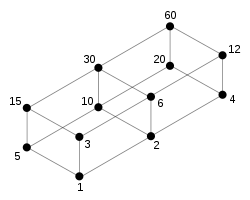Frugal number
In number theory, a frugal number is a natural number in a given number base that has more digits than the number of digits in its prime factorization in the given number base (including exponents).[1] For example, in base 10, 125 = 53, 128 = 27, 243 = 35, and 256 = 28 are frugal numbers (sequence A046759 in the OEIS), and in base 2, thirty-two is a frugal number, since 100000 = 10101.
The term economical number has been used about a frugal number, but also about a number which is either frugal or equidigital.
Mathematical definition
Let be a number base, and let be the number of digits in a natural number for base . A natural number has the integer factorisation
and is an frugal number in base if
where is the p-adic valuation of .
gollark: If somebody comes up with a decent modpack, I can run it on my server, which is able to handle at least three concurrent users.
gollark: Didn't someone make CCLuaJIT?
gollark: https://minecraft.curseforge.com/projects/bitcoin?gameCategorySlug=mc-mods&projectID=284386Best mod.
gollark: What about OC though?
gollark: It's weird, because my 50-mods-or-so server runs fine with as many as 2 users at once.
See also
Notes
- Darling, David J. (2004). The universal book of mathematics: from Abracadabra to Zeno's paradoxes. John Wiley & Sons. p. 102. ISBN 978-0-471-27047-8.
This article is issued from Wikipedia. The text is licensed under Creative Commons - Attribution - Sharealike. Additional terms may apply for the media files.
